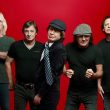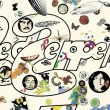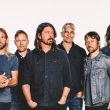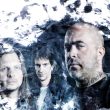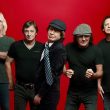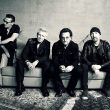Black Veil Brides, Andy Biersack Interview – ‘Scarlet Cross,’ Van Halen + More
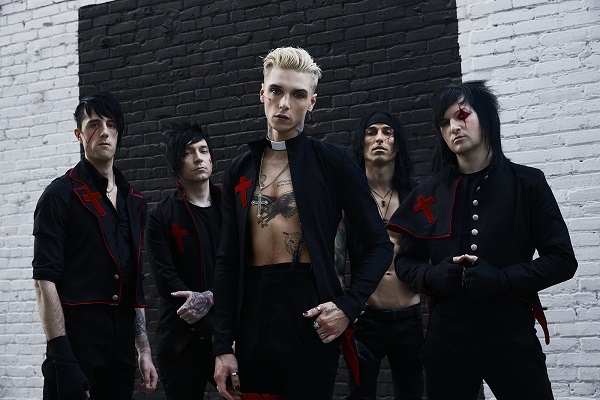
Black Veil Brides – Story by Anne Erickson, photo by Jonathan Weiner
Black Veil Brides’ Andy Biersack joins Anne Erickson to talk about the band’s latest single, “Scarlet Cross,” their new album on the way, the memory of Eddie Van Halen and more
When Black Veil Brides release a new album, or even just a single, it’s always a major event. The band is known for its dramatic vocals, majestic guitar work and theatrical delivery, and that’s earned them countless fans from young teenagers to generations up.
Andy Biersack, also known as Andy Black, from Black Veil Brides joined Anne from Audio Ink Radio to talk about the new single from Black Veil Brides, “Scarlet Cross,” the band’s new album on the way, the state of the guitar in modern music and more. Read the full interview below, listen via the YouTube player and hear it via the Audio Ink Radio podcast on Apple Podcasts here and Spotify here. Biersack’s interview marks the season opener for the Audio Ink Radio show’s 2021 season.
Anne Erickson: Andy, it’s great to talk with you. How are you doing during this crazy time?
Andy Biersack: I’m doing really well. I mean, it’s a bizarre situation. I think there’s really no way around it. It’s been difficult for everybody. It’s affected everyone on a personal level, whether it’s from an emotional level or a financial level or, in some cases, a medical level. Jinxx, my guitar player, was diagnosed with COVID, and he’s thankfully on the mend and he’s back upright in his home studio, working on parts and stuff for the record back again. The only issue for him right now is that he and his wife just had a child, and he can’t be around his baby. So, it’s just difficult. No matter how hard you try to be safe, there’s always something that could happen. Again, from the perspective that, as a musician, realistically, in 2020 and this era, our job and the thing that quite-unquote “pays our bills” is to go on tour, and to not be able to do that is difficult. Obviously, it’s financially difficult. It’s also just difficult to not be able to go on the road and play your music and connect with people. So, all around, it’s just been a year of learning how to kind of pivot and find a new way to do things. And, for us, that’s been all about recording and writing.
It’s great that you have the new record on the way, “The Phantom Tomorrow.” The first single, “Scarlet Cross,” features heavy riffing and a big sound. Is that style indicative of the record as a whole?
Yeah. I think that for us, there’s kind of this thing where a lot of bands that are our contemporaries have kind of strayed from the guitar-oriented, big chorus rock. And, that to me is like, that’s what we love. That’s the music that we make. If people grow apathetic to that type of music, that’s their prerogative. But for us, that’s what we love to make. That’s why we got into making music in the first place. The discovery, for me, of Kiss when I was a kid or for different reasons Bruce Springsteen or Meatloaf or any of these artists, was always the big chorus and the guitar solo and the fun and the sing-along nature of it. Then, from an emotional perspective, being able to write about concepts that resonate. So, I would certainly say that the song is indicative of the album, but it’s also- it’s a record that has different flavors and styles and ideas and concepts on there. So, the next song you hear from this record, in my opinion, won’t sound like “Scarlet Cross,” necessarily. But to us, the goal was always to have it sound like it’s by the same band and that it’s not by a stable of writers, writing for a specific genre so that somebody can have 30 different types of music on a given record. I like the idea of musical evolution, and I liked the idea of trying different things, but I also just as a rock ‘n’ roll fan, I like the idea of a band being a band and having their sound.
You mentioned some bands getting away from the guitar-driven stuff, and I think for a while there was the thought that young people don’t want to hear a guitar. Do you feel that’s changed?
Yeah. I mean, I think that there’s a huge misconception with people about how much rock there actually is in the world. You hear often times people who are in an older generation say that there’s no bands anymore that are trying, or there’s no guitar anymore- all this really misguided stuff. I always compare it to, I’m a Cincinnati Bengals fan, and I only really watch Bengals games anymore, because I just don’t really have time to sit down and watch all the games in the NFL. But, if I only watched Bengals games and then made the blanketed statement that all NFL teams must lose and that no NFL teams ever win, because I only watched the Bengals, you would call me a fool. You’d say, watch some other games. Get out there and see some other stuff. Other teams play.
But, there’s a certain generation of people who don’t acknowledge the fact that there is fun and art and pageantry and excitement and rock ‘n’ roll in the world. They’re just not looking for it. They think because their bands are no longer making records, no bands are. So, I think it’s a little bit of a misconception that there isn’t guitar bands out there. I think that us being able to be 10 years into our career and continuing success and having people still give a s*** about what we do is a testament to that. And, by the way, we’re not alone in that. It’s just that we’ve a band that’s been able to find success.
Fans are looking forward to “The Phantom Tomorrow,” and I’ve heard the record described as a concept album. Have you always embraced the idea of a concept album?
Well, we’ve done a number of them over the years, and I think that this probably is the most fully-realized concept. I would say that our first major-label record in 2011, I had wanted it to be a concept record, but my underdeveloped 19-year-old brain at that time or whatever- I wasn’t able to fully realize that. Then a couple years later, we did a record called “Wretched and Divine,” which was our first real full stab at figuring out how to build a story. I think that we were successful in doing that, but I think we’ve learned a lot of lessons through the way and how to really build out a record that not only has a story, but also is at its base level a rock ‘n’ roll record that is an enjoyable listen, whether you’re listening for the story or you’re listening for the album. I think that’s a really delicate balance that you have to find. I’ve mentioned before that I was a huge Kiss fan growing up and still am. They have the record, “Music from ‘The Elder,'” which in many ways is a very difficult thing to listen to because, in my opinion, they were not able to marry the music and the story in a way that would be enjoyable for even a casual listener. So, I think what we’ve got at this point is that we’ve done everything we can over the last number of years to figure out how to make a kick a** rock record that also has an ornate and kind of over the top story that runs through it.
You mentioned that Jinxx is still working on the album. So, it isn’t quite finished yet?
I would say, here’s the thing, we’ve just been enjoying doing this so much that what initially we kind of projected to be the end date, and when we thought we’d be done with the material, has kind of been pushed back a little bit, because we’re just really enjoying writing, and we think we’re writing better and better stuff. So, the reality is, I think you’re going to see stuff a little bit sooner than you anticipated, and you’re going to see more stuff through the long run.
Based on what you’re hearing in the industry, what are your thoughts on when traditionally concerts will be back?
I am hearing that there is some hope for the summer, but that it’s most likely looking like the fall for any actual touring. But, that’s a moving target. That changes all the time. I can remember, when this all first started, and we had cancellations and postponements that we were being told, “Well, we’re going to postpone this until September.” Obviously, here we are, and that didn’t happen. So, it’s a moving target. I think that not only does the industry have to move with that, but so does, obviously, the medical regulations and the concepts that are put out there, how to protect yourself. That changes every day as well. So, it’s hard. It’s a year where for us, we’ve really had to just accept the fact that it was not going to be a financially viable year. But, we’re doing all we can. At the end of the day, it’s been a time to really focus on the art of it and to make music because we love making music, and you do what you can to get by.
You have talked about having a love for Kiss growing up. Were you a fan of Van Halen, and what are your thoughts on losing the great Eddie van Halen?
You know, it’s one of those things, where it’s actually kind of funny. I wasn’t a Van Halen fan as a kid, and not for lack of trying. My dad, who introduced me to Kiss and all the other bands that I ended up listening to, was always trying to get me to like Van Halen. But, there was just something about David Lee Roth that just didn’t connect with me. And, as an adult, I kind of found it later and grew to really love and appreciate what they are as band and how important they were. So, obviously, there’s a lot of things that play into Kiss where Eddie played on “Christine Sixteen” and a number of other songs. Obviously, the band was originally discovered by Gene Simmons, and he tried to sign them, and they were basically turned away by the original management company saying that this band wasn’t going to succeed. And, I’ve also resonated heavily, personally, with kind of their story in the sense that, not to take it away from Eddie too much, but when it comes to David Lee Roth, he’s someone that when he first started, people said he couldn’t sing, and he had a very different kind of voice. They said he wasn’t going anywhere. When we first started, that was the same sort of critiques that we were getting, that we had amazing guitar players but the singer can’t sing. That was one of the things we heard all the time. So, I can really relate to their story in that way, and to lose- I’m in my living room right now, and Juliet and I have these pictures all around our living room of the cream of the crop rock stars. We’ve got all these framed photos of their mug shots.
We always just thought it was interesting to get to see these stars that we grew up with and see that they also did things that were crazy. Because, sometimes, anybody can feel, man, did I make the right decision? Or, maybe that song was terrible, and is this going to ruin everything? And we kind of liked the idea- we have all these art pieces in our living room of Bowie and Mick Jagger and Jimi Hendrix and all the main stars. As I look around this room, so many of them have now passed, and it’s truly a bizarre feeling to think of these incredible, mammoths of rock. I always say, “When rock stars roamed the earth.” All these pillars of the culture that I grew up in and idolizing. The fact that so many of them are gone is just heartbreaking. I don’t think you can ever possibly even speak to the level of importance that Eddie Van Halen had without even underselling it, because he kind of, singularly, created the idea of a guitar hero and that style of guitar playing and created a style that had never been heard and then was immediately replicated or tried to be replicated by everybody under the sun after that. And, that is extremely unique and extremely important. It was a huge loss for the rock community, and a huge loss for the world.
- 3 Underrated Foo Fighters Songs That Should Have Been Hits - June 23, 2025
- The Most Iconic U2 Album of All Time - June 18, 2025
- 3 Underrated Iron Maiden Songs - June 15, 2025



